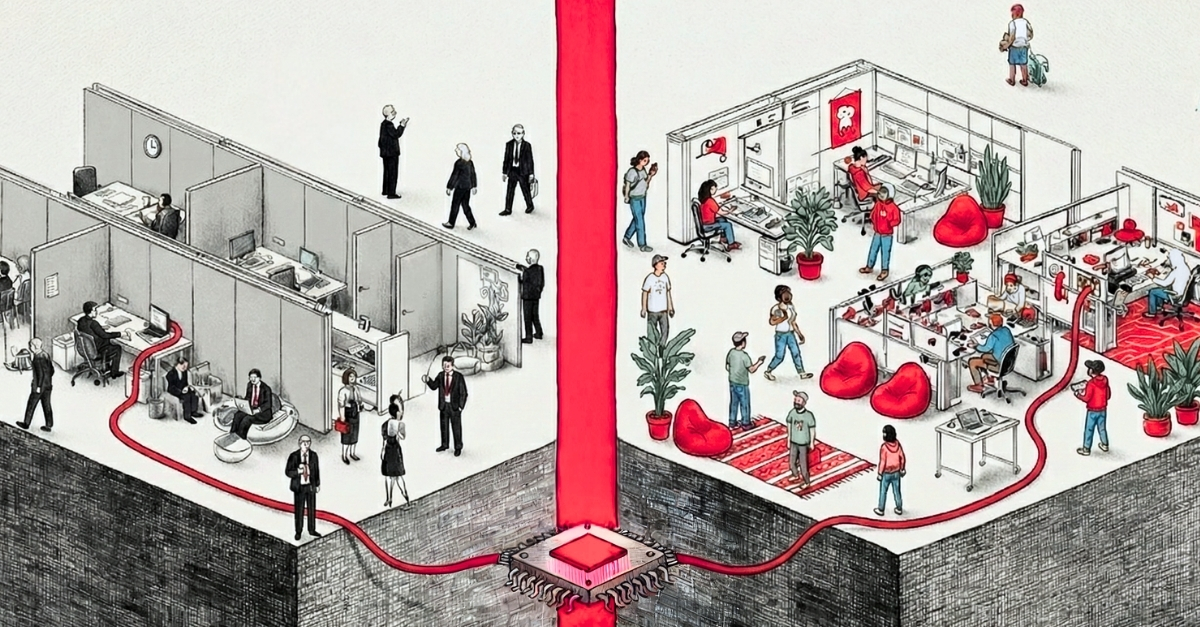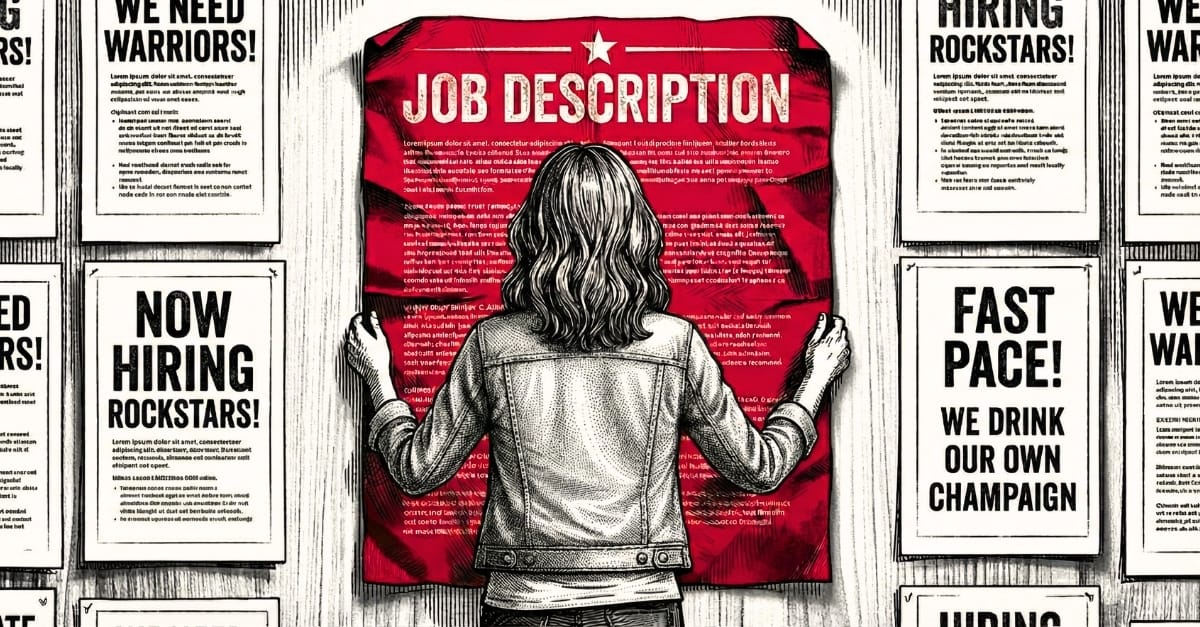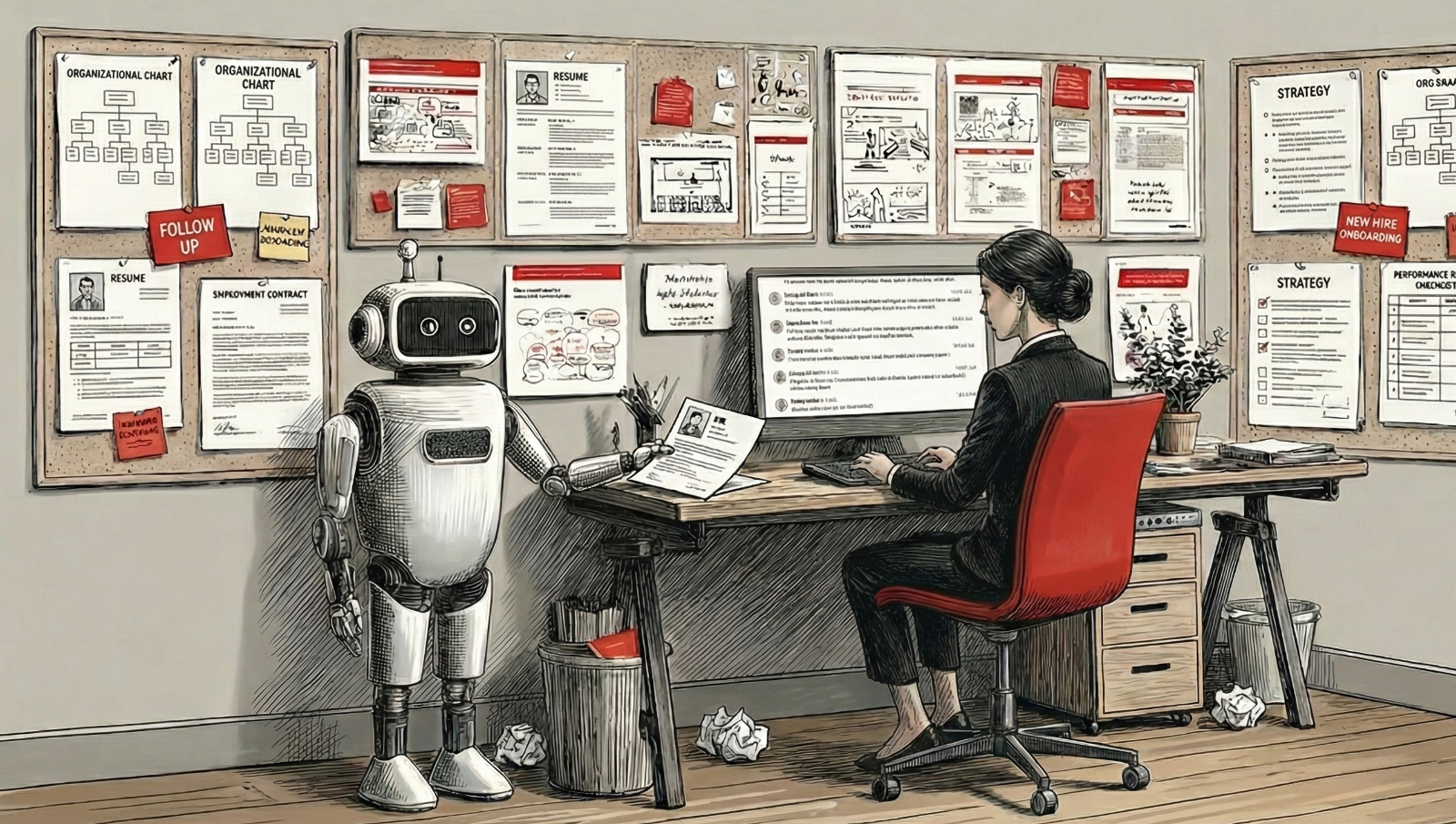Hello! My name is Adam and I’m an Adapter. I’m here to give you a glimpse into the world of Adapters—how we work and how others work with us. But first, here’s some background information about me.
I’m a sales and marketing operations specialist at the The Predictive Index (PI). My responsibilities include the collection and analysis of sales and marketing data, taking an ongoing pulse of our marketing activities, and supporting the team so that they can generate leads and sales. While my responsibilities to both the sales team and marketing team are similar, the teams themselves are very different. The majority of my job is bridging these differences into common processes that improve interdepartmental efficiency.
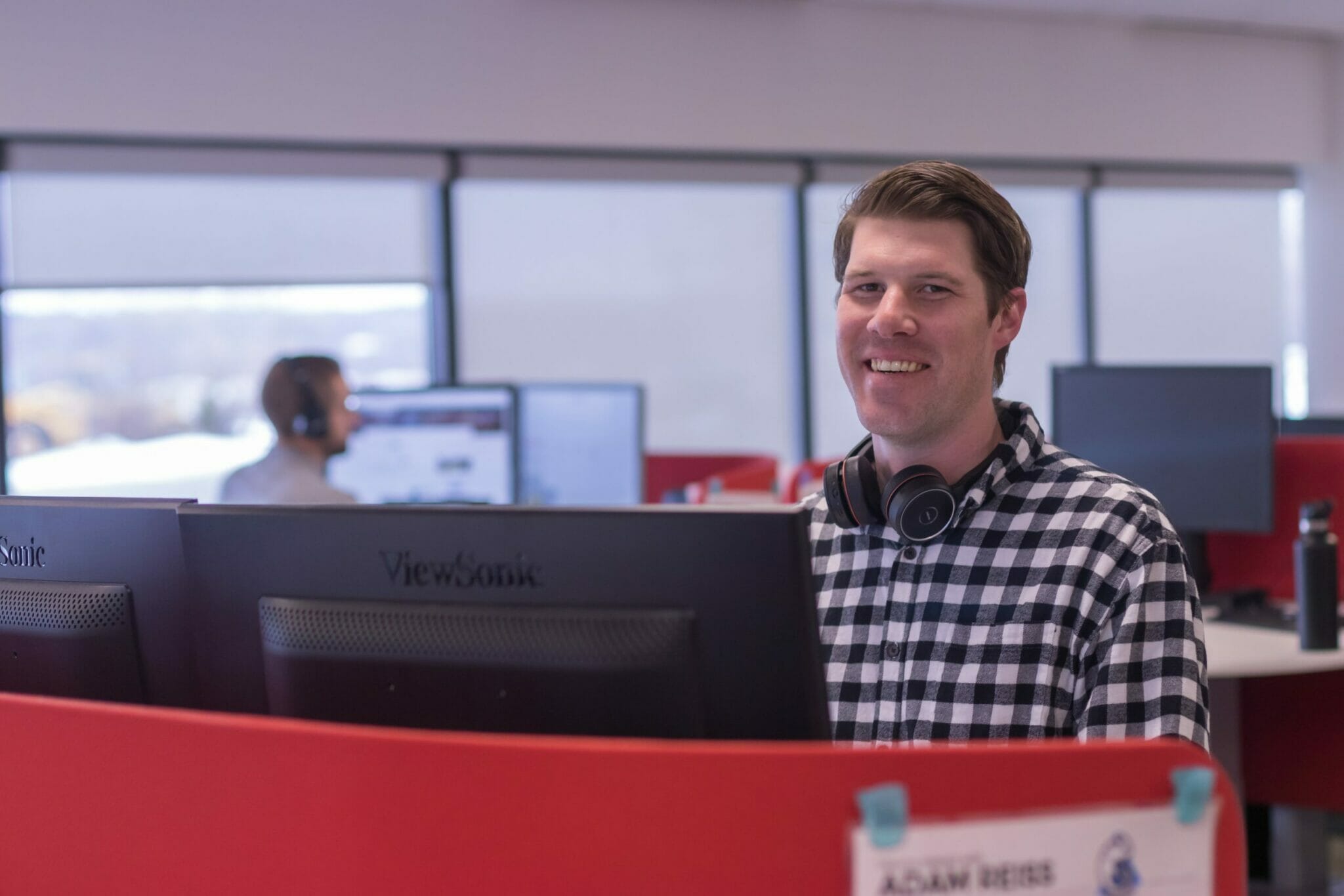
My manager is an Artisan, which means she is naturally cautious, analytical, and results oriented. She takes the time to share her knowledge and be sure I am constantly adding new tools to my professional tool belt.
She goes to great lengths to ensure her work is of the best possible quality, no matter what it takes to get there, whether it’s time, data collection, or attending meetings.
The teams we work with are dominated by Mavericks and Persuaders—social people, who prefer unstructured work and can be seen as “fast and loose” by others, especially among those with analytical PI Reference Profiles. As an Adapter, I occupy a happy in-between position. Much of my personality is situational, I enjoy enabling others and am always willing to be the glue layer for cross-functional teams such as these. I enjoy problem solving, whether it’s a question of data analysis or a matter of stabilizing strong personalities.
My behavioral pattern
The PI Behavioral Assessment™ essentially reveals where you fall on the spectrum of Four Factors:
- Dominance: Dominance is the drive to exert one’s influence on people or events.
- Extraversion: Extraversion is the drive for social interaction with other people.
- Patience: Patience is the drive for consistency and stability.
- Formality: Formality is the drive to conform to rules and structure.
Here’s my pattern:
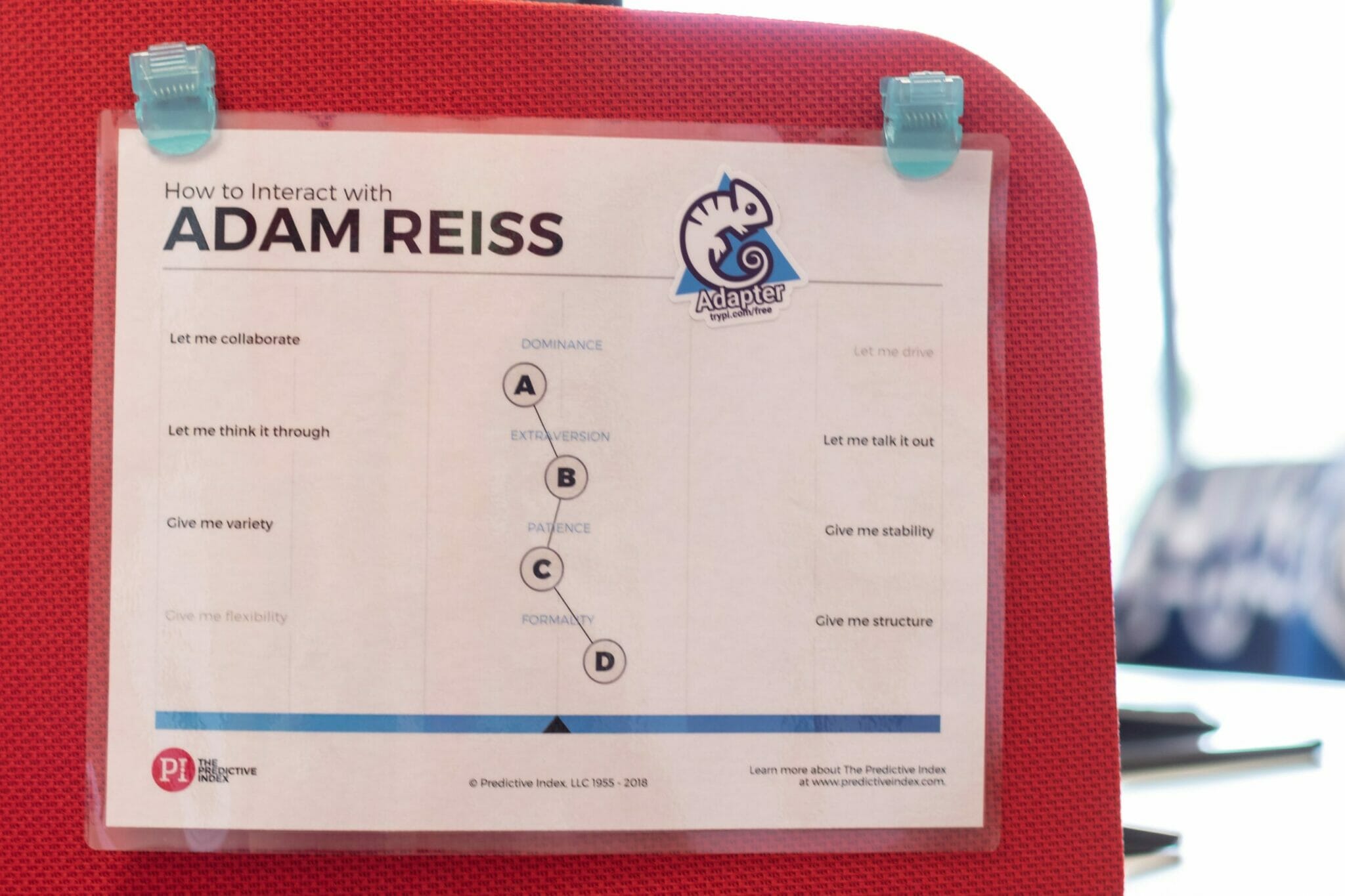
To the uninitiated, that behavioral pattern may not mean a whole lot, which is where Reference Profiles come in. All behavioral patterns map most closely to one of our 17 Reference Profiles, which gives us a way to paint the picture of someone’s behavioral drives in broad strokes. You can think of these as easy-to-reference groupings of the characteristics of people who have similar drives.
My Reference Profile is Adapter
Adapters have a similar amount of each the behavioral drives. There is no predominant drive that really fuels his or her needs and behaviors.
Adapters can be hard to read at times because there is not a strong drive that defines their behavior. This situational flexibility is the beauty of Adapters. They are generally versatile and adaptable, flexing to meet the needs of the situation. Adapters can easily work with a variety of people and are often seen as a bridge-builders in a team setting. We view all sides of a situation, easily putting ourselves in someone else’s shoes.
When I first learned about my Reference Profile it made me a bit nervous! Typically at PI, we see behavioral patterns in which a person has a few behavioral drivers, but for me, I don’t have one behavioral drive that overrides another. Upon digging into my Reference Profile a bit more, I realized that the Behavioral Assessment™ hit the nail on the head. The Adapter Reference Profile proved right—I enjoy working in a team but also enjoy independent ventures. I can take control of a situation when I need to or sit back as an impartial observer when I think everything is under control and stakeholders have a good handle on the big picture. I really enjoy being social but it’s not a critical necessity. I work to examine and improve processes but can manage flying by the seat of my pants when I need to.
Join 10,000 companies solving the most complex people problems with PI.
Frankly, the Adapter profile fits me perfectly. I find that I like jobs which allow me to be a dynamic team member or a stable independent actor. Mostly, I like connecting people and ideas!
Adapter coming through!
I have been involved in interdisciplinary research for the duration of my career, covering everything from investment banking to coffee to coral reefs. As someone who likes to connect the dots, I’m suited to research-based work and my Adapter Reference Profile makes it easy to move between qualitative and quantitative research. My curiosity pushes me to dig deep and thoroughly understand the big picture, whether it requires conceptual or methodological work.
“Sometimes others expect Adapters to adapt to anything, which means sometimes you inherit work that really does not suit your needs.”
My behavioral pattern shows that my Formality drive is higher than my Dominance drive, meaning I naturally work to minimize risk. Understanding the big picture and the possible positive or negative outcomes is part of my natural thought process. I enjoy entering projects with a lot of white space and building systems from the ground up. Whether it’s establishing a new marketing channel, setting up metric programs, or overhauling a website, I’m happy to set up goals, definitions, and processes.
In group settings, Adapters can move from the position of impartial observer to group leader when the situation calls for it. Since I tend to switch between being a quiet, independent thinker and a social contributor, I shine in cross functional team-management scenarios, especially when personalities and goals aren’t totally aligned. I invite the participation of others to help solve problems and wrap our heads around any hidden challenges. I’m happy to let everyone determine their own “how,” so long as everyone is in agreement on the “why.”
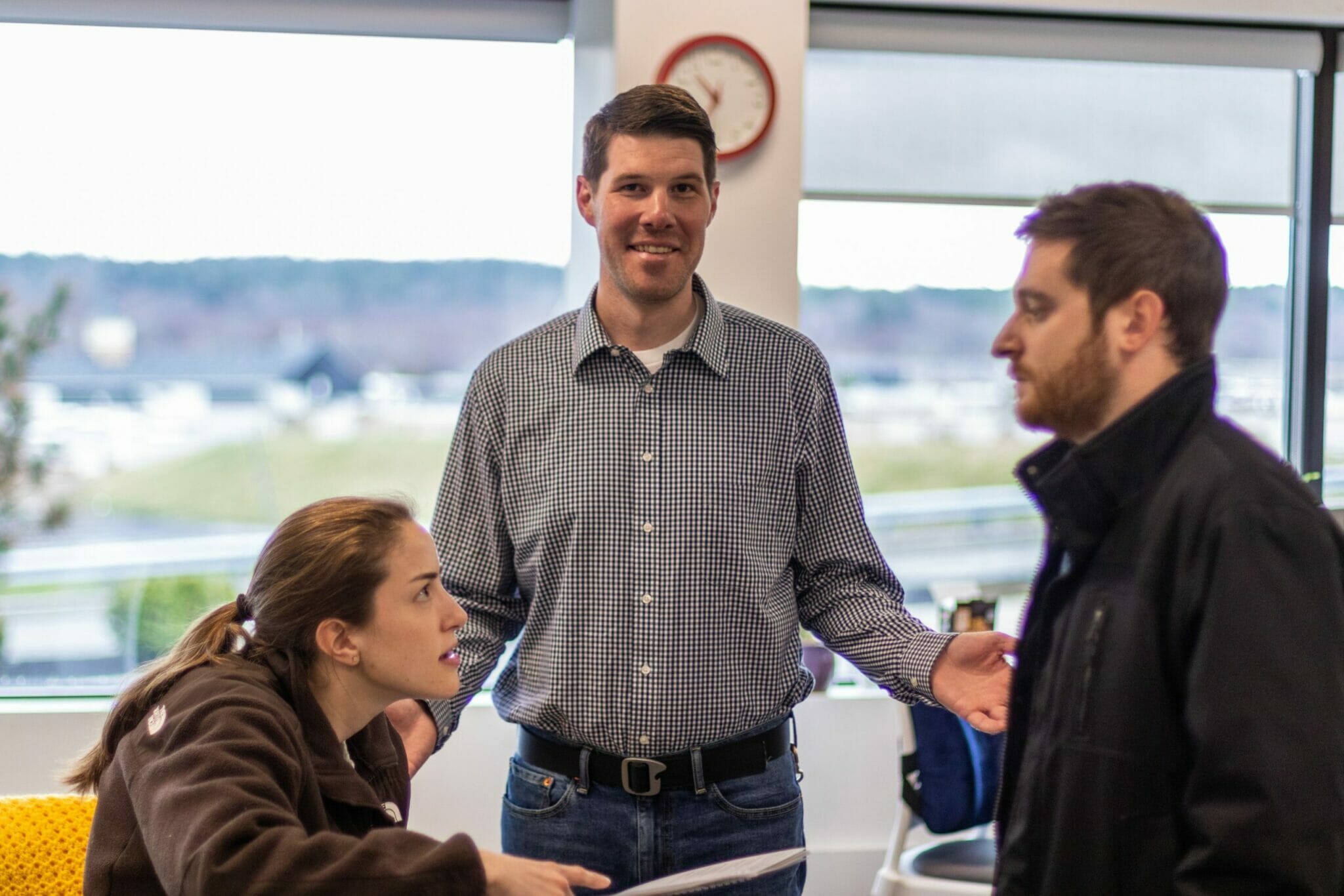
The dark side of being an Adapter
Sometimes others expect Adapters to adapt to anything, which means sometimes you inherit work that really does not suit your needs. For example, I had a boss who thought that my situational behavioral pattern meant that I could successfully do things even if they were far outside of my needs. No matter how good I am at adapting, I can’t flip a switch, hop on the phone, and start making outbound cold calls to potential sales leads. Pre-call prospecting and research is something that is fully in my wheelhouse, but it’s really hard for me to be extroverted enough to comfortably cold call someone.
“After learning that I am an Adapter, I can see why I’ve taken past jobs and why people look to me to help them get their head around things.”
On the flip side, sometimes I forget that others are a little less adaptive and trying to change the way they do things is not productive. When presented with overly formal or highly unstructured scenarios, it doesn’t take long before I start scratching my head…Why isn’t there a process here or why is there so much red tape there? Probably because the person driving the initiative has needs and drivers that are different from my own. In my case, “let’s make it easy” usually means gathering data and putting together a plan, then executing it. It takes time. Movers and shakers sometimes forget that. My responsive nature combined with my need for Formality can make fire drills (“IMPORTANT! NOW!”) very difficult to manage without a bit of pain.
Being a data driven Adapter sometimes means I spend a bit too much time thinking things through when I should have been level-setting with other stakeholders. I want to present a fully-baked plan covering A to Z, often leaving out the other 24 steps in my plan because I already thought that through! Luckily, the average person I work with is interested in those 24 steps. I can show my work but sometimes that means lots of discussion to get through the minutiae.
How to work with (and manage) this profile
As a social, risk-mitigating Adapter, I need to have data to support decisions and I need some flexibility in deadlines and objectives. I need the opportunity to collaborate and build relationships with others.
Opportunities to increase my expertise should be included in my day-to-day. An engaged manager who is willing to share his or her skills is required in managing this Reference Profile. Sometimes I need a bit of pressure to act as a focus mechanism, but I do need a steady workflow underlying high-pressure or flexible situations.
I can be difficult to read. Sometimes my attempts to understand or fully consider all the possibilities can be seen as skepticism or unwillingness to go along with a plan, so my manager should give me time to think things through and then talk them through to get a true read on how I feel about the what, when, and how. A productive, informal, engaged relationship with my manager and peers is critical to my needs as an Adapter.
“Learning about my Reference Profile allowed me to see that I have more value than just producing a highly detailed metrics dashboard.”
After learning that I am an Adapter, I can see why I’ve taken past jobs and why people look to me to help them get their head around things. I have a penchant for finding the details, managing the how, and communicating the why. The positions I have been drawn to have always had an element of research, strategic decision making, and collaborating with others, but also working independently. Among my friends, I’m the one people ask when they’re interested in something new. They joke that they will ask a question and know that a barrage of information will follow shortly.
At work, my internal clients are predominately Mavericks or Persuaders and I’m managed by an Artisan. Learning about my Reference Profile allowed me to see that I have more value than just producing a highly detailed metrics dashboard. I am here to bridge gaps, help people work together, and bring new ideas to the forefront for our Marketing team.
In the past, I have been in a few positions where I was primarily working independently, without much interaction with peers or management. I always thought that was because I’m a bit of an introvert (thanks, MBTI). In reality, I’m a social person! I just don’t like to be overly dominant. My Adapter Reference Profile has helped me see that working with others AND data, along with having a little bit of influence, are the keys to me being happy at work.


